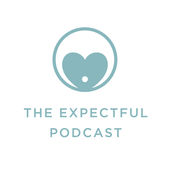
The Expectful Podcast – The Five Universal Truths Of Your Fourth Trimester
Why this podcast?
This one is a fairly recent discovery for me but I really like it. I featured the episode How To Love Your Birth – However It Looks back in January and, whilst listening to episodes in the meantime, I found one in particular that I really wanted to share.
As well as airing a fantastic podcast, Expectful also offers guided meditations for fertility, pregnancy and motherhood. Whilst listening to various pregnancy and birth podcasts I have heard women refer again and again to these meditations so there must be something to them!
The host and community guide, Anna Gannon, is also a mum, writer and yoga teacher. She has a beautiful, serene presence that really comes across in each episode.
I love how passionate she is about birth and all that surrounds it and she often asks her guests questions to take listeners deeper into the subject. At the same time, she is able to sit back and allow the conversation to flow.

How does it look?
Episodes last between thirty and forty-five minutes and have covered areas including getting pregnant naturally; grace, motherhood and healing; mindset and motherhood; boosting sleep for you and your baby; balance over perfection; pregnancy loss; fertility, emotional well-being and IVF; how to feel empowered during birth and using Feng Shui during pregnancy and the postpartum.
The podcast launched in July 2017 and there are nearly forty episodes to choose from.
It really is worth exploring.

Why this episode?
We tend to focus so much on pregnancy and birth that we often forget that perhaps the biggest shift comes after that, once our babies arrive.
This episode features Kimberly Ann Johnson who is a doula, Sexological Bodyworker, and Somatic Experiencing Practitioner.
“She believes that when nurtured and taken care of properly, women can emerge from this rite of passage stronger, more whole, and with more access to their power.”
Kimberly looked at various countries around the world and found that there are five universal things that women need during their postpartum period.
Kimberly believes so powerfully in the need for women to have this fourth trimester that she wrote a book, The Fourth Trimester: A Postpartum Guide to Healing Your Body, Balancing Your Emotions, and Restoring Your Vitality.
This episode explores those five truths as well as so much more.
Who should listen to this episode?
Anyone expecting a baby, their partners, family, friends and neighbours. You’ll see why when you later.

The episode
There is such a wealth of love, wisdom and knowledge in this episode that it would be ridiculous to try and cover it all here and I know I couldn’t do it justice.
I plan to outline the five things new mothers need as well as bringing in a few other thoughts that stood out and then I invite you, wholeheartedly, to explore this episode in full.
So, what are the five things every new mother needs?

#1 – An extended period of rest
In many countries new mothers spend thirty to forty-five days at home, they rest and let others take care of them. This cocooning helps to restore the mother’s energy, her life force.
During the episode, Kimberly talks about how in today’s western culture many new mothers have the goal of being back on their feet, back in their pre-pregnancy body and back to doing everything they did before, as an important goal.
Being a badass and a superwoman are held up as ideals. I thought it was super interesting when Kimberly said that many women born in the 1970’s and 1980’s grew up learning that they could do everything that men could do. The problem is that while we loaded all those extra roles and responsibilities onto our plates, we didn’t take anything off.
Asking for help is seen as a sign of weakness when it really isn’t.
Taking the time and space during that fourth trimester to recognise that we are not machines or superwomen and that we need love, support and yes, rest, just like everyone else, can be a valuable lesson to carry through our whole lives.

#2 – Nourishing food
At first, this means broths and soups which support the body’s elimination process and help cleanse the womb. Then, foods that have re-building properties and which are rich in collagen and minerals, are important.
In many parts of the world foods like seaweed and a special kind of chicken are used. I like that Kimberly also stresses that it is important for new mothers to have enough food. Not only do their own bodies need to revitalise and recover but breastfeeding needs to be supported as well.
Think about arranging for friends, neighbours and family to come and cook for you or to drop nutritious meals over so that you can focus solely on yourself and your baby.

#3 – The companionship of wise women
So many women in our western society now spend a lot of time alone with their babies. It is so easy to feel isolated, lonely and maybe even depressed in that situation.
Find other people, apart from your partner, who can come and be with you. People who will listen to how you are doing both emotionally and physically and who will validate how you are feeling.
This could be a postpartum doula, who could also help with the first two points, or simply friends or family. They don’t have to be female, just be sure that they are there to listen with warmth and empathy and to hold space for you and your experience.

#4 – Loving touch
Many cultures around the world have specific bodywork or massage for the postpartum period.
Examples that some women in the west are beginning to take on board include belly binding and the closing of the bones ceremony.
If you don’t feel that specific rituals are for you, loving touch could be something as simple as your mum brushing your hair, your partner rubbing your feet or a friend giving you a gentle shoulder massage.

#5 – Contact with nature
This could be as simple as ensuring that the chair you breastfeed in faces the window so that you can see the trees or your garden, or adding herbs to your food or tea.
For me, this is about feeling a connection with both the outside world and with something bigger than yourself.
I love that Kimberly underlines that these five principles sound like luxuries but are actually necessities.
Yes, necessities.
Not everyone will be able to incorporate them in exactly the ways discussed, but I believe that everyone can find some way to bring the elements of these five universal truths into their own fourth trimester.
Highlights from the rest of the episode
Where do I start? So many ideas came up that really stood out for me. I’m going to share a few of them and I hope you will be inspired to go and listen to the whole of this wonderful episode.

What if we actually brought these elements into our postpartum?
If we had enough rest, someone to make us healing, nourishing food, people to sit with us and focus on what we are feeling and how we are doing, to provide that loving touch and if we had some contact with nature, what could that mean?
I was really struck when Kimberly suggested that having all that in our postpartum lives doesn’t leave much space for depression, isolation and loneliness.
Now, that struck me as both a wonderful insight and a pretty controversial thing to say.
I do not want to suggest that all cases of postpartum mood disorders could be avoided by involving these five principles in our post-birth lives.
But, I can’t see how involving them could be negative and, personally, I think these elements would have really helped me to feel less isolated and overwhelmed as a brand new mum.

Your postpartum plan is just as important as your birth plan
Kimberly suggests that it might even be more important. Becoming a mother is a HUGE change. You cannot and will not be the same afterwards.
There is no going back to exactly how and who you were, just, you know, with a baby.
You will change physically, emotionally, spiritually and your relationship with your partner will change.
Thinking about this during pregnancy and talking to your partner before your baby arrives are key.
Kimberly suggests talking to your partner about things like how you deal with stress, who will do the small, household jobs after baby arrives and how you will continue to have that sense of intimacy once there is a brand new person around.

To wrap up
I love that Kimberly underlines that just as with birth, new parenthood also brings a certain lack of control.
Whilst that can be scary for a lot of people, it can also be beautiful.
In a place and time where we tend to use the thinking part of our brain in almost every situation, birth and the postpartum period give us the opportunity to really live in our bodies and experience far more instinctive, intuitive urges and responses.
We know that, generally, birth goes smoothest when we leave the left side of our brain out of the equation and allow the primal, right side to take over.
What might happen, I wonder, if we took that with us into our fourth trimester?
What if we listened, truly listened, to our bodies and our babies and provided everything they needed?
How many women’s postpartum experiences could be made wonderful instead of overwhelming and isolating?
I think I’d like to see.
How about you?
Emily Wills is a doula based in Stockholm. She believes that birth can be a beautiful and empowering experience and started this blog as a way of sharing some really great podcasts. She is also a mother of three and an enthusiastic runner.
